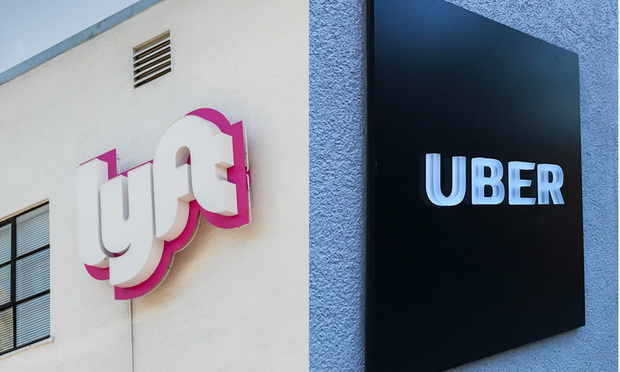In DQ Fight With Uber Over Former Chamber Lawyer, Plaintiffs Firm Points to 'New Evidence'
The source of the evidence? Declarations in a new suit filed against the law firm by Uber's biggest rival, Lyft Inc.
November 28, 2018 at 06:27 PM
3 minute read
 Lyft and Uber. Photo: Jason Doiy/Diego M. Radzinschi/ALM
Lyft and Uber. Photo: Jason Doiy/Diego M. Radzinschi/ALM
A law firm pursuing a suit against Uber Technologies Inc. claims it found new evidence supporting its argument that it shouldn't be disqualified from the case because of the work one of its lawyers handled while working alongside the ride sharing company in a prior gig with the Chamber of Commerce.
The source of the evidence? Declarations in a new suit filed against the law firm by Uber's biggest rival, Lyft Inc.
The labyrinthine tale of the former Chamber-lawyer-turned-plaintiffs lawyer now in the crosshairs of both Uber and Lyft didn't really get underway until September. That's when lawyers from Keller Lenkner, including former Chamber lawyer Warren Postman, filed suit claiming that the way Uber classifies its drivers as contractors allows the company to unfairly compete with the firm's client, Studio City, California-based livery service Diva Limousine Ltd.
Lawyers for Uber at Morgan, Lewis & Bockius, in turn, have argued that Keller Lenkner should be disqualified from handling the lawsuit because Postman had access to “privileged and confidential” Uber information when litigating alongside the company in a case where the Chamber challenged a Seattle ordinance aiming to allow independent contractors such as Uber drivers to collectively bargain.
In the run-up to a hearing on Uber's motion to disqualify, Lyft and its lawyers atKeker, Van Nest & Peters filed a declaratory judgment and preliminary injunction complaint against Postman and the Keller Lenkner firm Nov. 16, the Friday before Thanksgiving. Lyft's suit asked that the firm and Postman be barred from pursuing all worker misclassification claims against Lyft, claiming that Postman had a duty of confidence to Lyft because of his “common-interest” work with the company, including the Seattle litigation. The suit also sought compensatory, punitive and consequential damages “in an amount well-exceeding $75,000.”
In the Lyft action, the Keker lawyers filed declarations by lawyers who worked with Postman at the Chamber who detailed the funding and information-sharing relationship the Chamber had with Lyft regarding the Seattle case.
In court papers filed Wednesday, the Keller Lenkner lawyers attempted to wield those declarations to argue that Postman only had access to “public facts or legal framing” in the Seattle litigation—types of information that they say don't support disqualification under California law.
“The new evidence of Lyft's involvement in the case confirms counsel's implicit concession: non-public facts critical to this case were not shared,” wrote the Keller Lenkner lawyers. “Uber would never—let alone 'normally'—have shared such information when it knew that the Chamber was regularly communicating with Lyft about the case; that the Chamber was represented by Lyft's longtime counsel, Jones Day; and that Lyft was paying the Chamber's legal bills.”
Reached Wednesday, Travis Lenkner declined to comment beyond the court papers.
Uber's lawyer, Brian Rocca of Morgan Lewis, and Lyft's lawyer, Keker's Rachael Meny, didn't immediately respond to messages seeking comment.
This content has been archived. It is available through our partners, LexisNexis® and Bloomberg Law.
To view this content, please continue to their sites.
Not a Lexis Subscriber?
Subscribe Now
Not a Bloomberg Law Subscriber?
Subscribe Now
NOT FOR REPRINT
© 2025 ALM Global, LLC, All Rights Reserved. Request academic re-use from www.copyright.com. All other uses, submit a request to [email protected]. For more information visit Asset & Logo Licensing.
You Might Like
View All
'A Death Sentence for TikTok'?: Litigators and Experts Weigh Impact of Potential Ban on Creators and Data Privacy

‘Extremely Disturbing’: AI Firms Face Class Action by ‘Taskers’ Exposed to Traumatic Content
5 minute read

Patreon Hit With Lawsuit for Allegedly Diverting Subscriber Data to Meta
Trending Stories
- 1How Law Firms Can Make Business Services a Performance Champion
- 2'Digital Mindset': Hogan Lovells' New Global Managing Partner for Digitalization
- 3Silk Road Founder Ross Ulbricht Has New York Sentence Pardoned by Trump
- 4Settlement Allows Spouses of U.S. Citizens to Reopen Removal Proceedings
- 5CFPB Resolves Flurry of Enforcement Actions in Biden's Final Week
Who Got The Work
J. Brugh Lower of Gibbons has entered an appearance for industrial equipment supplier Devco Corporation in a pending trademark infringement lawsuit. The suit, accusing the defendant of selling knock-off Graco products, was filed Dec. 18 in New Jersey District Court by Rivkin Radler on behalf of Graco Inc. and Graco Minnesota. The case, assigned to U.S. District Judge Zahid N. Quraishi, is 3:24-cv-11294, Graco Inc. et al v. Devco Corporation.
Who Got The Work
Rebecca Maller-Stein and Kent A. Yalowitz of Arnold & Porter Kaye Scholer have entered their appearances for Hanaco Venture Capital and its executives, Lior Prosor and David Frankel, in a pending securities lawsuit. The action, filed on Dec. 24 in New York Southern District Court by Zell, Aron & Co. on behalf of Goldeneye Advisors, accuses the defendants of negligently and fraudulently managing the plaintiff's $1 million investment. The case, assigned to U.S. District Judge Vernon S. Broderick, is 1:24-cv-09918, Goldeneye Advisors, LLC v. Hanaco Venture Capital, Ltd. et al.
Who Got The Work
Attorneys from A&O Shearman has stepped in as defense counsel for Toronto-Dominion Bank and other defendants in a pending securities class action. The suit, filed Dec. 11 in New York Southern District Court by Bleichmar Fonti & Auld, accuses the defendants of concealing the bank's 'pervasive' deficiencies in regards to its compliance with the Bank Secrecy Act and the quality of its anti-money laundering controls. The case, assigned to U.S. District Judge Arun Subramanian, is 1:24-cv-09445, Gonzalez v. The Toronto-Dominion Bank et al.
Who Got The Work
Crown Castle International, a Pennsylvania company providing shared communications infrastructure, has turned to Luke D. Wolf of Gordon Rees Scully Mansukhani to fend off a pending breach-of-contract lawsuit. The court action, filed Nov. 25 in Michigan Eastern District Court by Hooper Hathaway PC on behalf of The Town Residences LLC, accuses Crown Castle of failing to transfer approximately $30,000 in utility payments from T-Mobile in breach of a roof-top lease and assignment agreement. The case, assigned to U.S. District Judge Susan K. Declercq, is 2:24-cv-13131, The Town Residences LLC v. T-Mobile US, Inc. et al.
Who Got The Work
Wilfred P. Coronato and Daniel M. Schwartz of McCarter & English have stepped in as defense counsel to Electrolux Home Products Inc. in a pending product liability lawsuit. The court action, filed Nov. 26 in New York Eastern District Court by Poulos Lopiccolo PC and Nagel Rice LLP on behalf of David Stern, alleges that the defendant's refrigerators’ drawers and shelving repeatedly break and fall apart within months after purchase. The case, assigned to U.S. District Judge Joan M. Azrack, is 2:24-cv-08204, Stern v. Electrolux Home Products, Inc.
Featured Firms
Law Offices of Gary Martin Hays & Associates, P.C.
(470) 294-1674
Law Offices of Mark E. Salomone
(857) 444-6468
Smith & Hassler
(713) 739-1250






